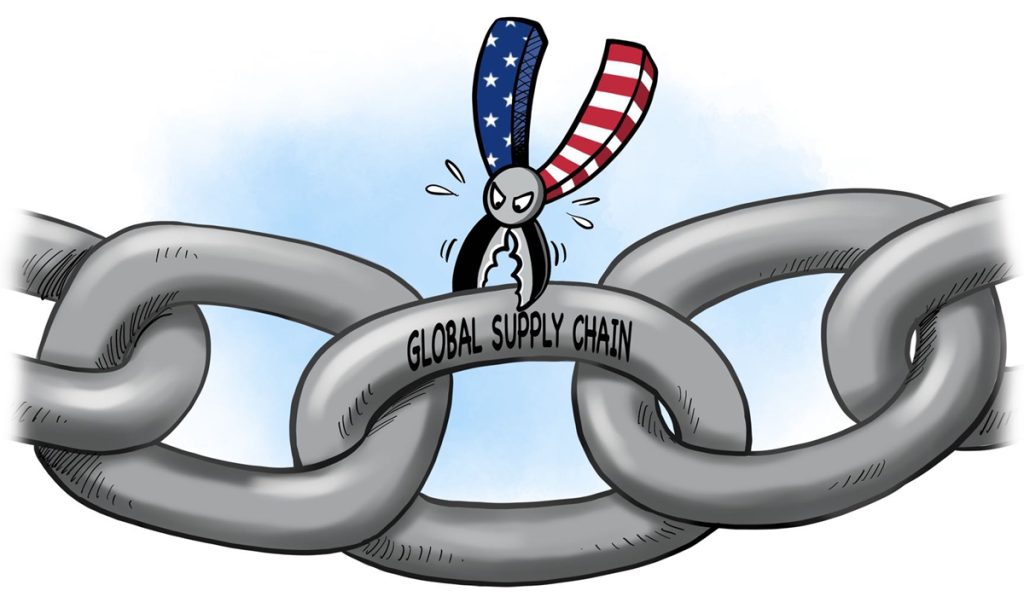GT Voice: Blaming China ‘self-deception’ for US industries, not a solution

It seems that the US can't come up with a solution to improve its manufacturing sector without scapegoating China. This has become a disease spreading from US politicians to industries.
The US Steelworkers and other unions on Tuesday filed a petition with the US Trade Representative (USTR) office calling for an investigation into what they allege as China's "unreasonable and discriminatory" practices in the global maritime, logistics and shipbuilding sectors, the South China Morning Post reported on Wednesday.
The petition, which was filed under Section 301 of the Trade Act of 1974, even asks the USTR to impose docking fees on Chinese vessels in US ports.
The unions appear to be seeking measures and support to help the American shipbuilding industry and its workers, but they are actually deceiving themselves in targeting China. This only reflects their own anxiety and frustration over the lack of a solution to boost US manufacturing.
Amid the distorted atmosphere toward China in the US, blaming China is the easiest and cheapest way to gain support, but this will only further lead the US astray, instead of addressing its real problems.
For instance, the idea of imposing docking fees, which is another form of tariffs, is ridiculous, as its potential effect is nothing but increased international shipping costs for US imported goods and a heavier burden on American consumers. Wouldn't it put the US economy, which is still struggling with inflation, into another hole?
Chinese shipbuilding companies have maintained the leading position in global market competition. In 2023, China's shipyards accounted for 50.2 percent of the world's completed volume, 66.6 percent of new orders, and 55 percent of order backlogs, pushing the nation's market share to a record high.
The booming performance of Chinese shipbuilders reflects the country's many skilled workers, manufacturing strengths and advanced technologies, as well as the close cooperation with other global suppliers in the shipbuilding industrial chain.
It's blind and arrogant for some to claim that these competitive advantages are due to "unreasonable and discriminatory" practices.
The US seems to be trapped in a strange logic. It presumes that as long as Chinese manufacturing goes down, American manufacturing will rise. From the former Trump administration to the incumbent Biden administration, Washington has used this logic to justify the imposition of punitive tariffs on Chinese imports worth billions of dollars and take various measures to suppress Chinese manufacturing.
US politicians have created many labels to smear Chinese manufacturing, such as "unfair subsidies," "national security threats" and "forced labor." For instance, anti-China US politicians have claimed that heavy-duty cranes produced by Shanghai Zhenhua Heavy Industries Co can act as a "Trojan horse," making a fuss over common sensors installed for the maintenance of equipment and operational safety.
But it is impossible for anyone with a rational mind to fail to see the obvious fact that there is no way to boost American manufacturing by cracking down on Chinese manufacturing. Focusing their efforts on China is a lame cover for their inability to find a real solution to the decline of American manufacturing, while protectionism is self-deception.
Numerous examples have proven that the more an industry is protected, the less likely it is to become strong and competitive in the market. Take the US steel industry.
When the US steel industry turned to the US government for help, Washington often imposed high tariffs to protect the industry. In March 2018, former US president Donald Trump imposed 25 percent tariffs on the import of virtually all steel products. This did not alter the fate of the US steel industry but instead accelerated its decline.
In December 2023, Japan's Nippon Steel announced plans to reach a deal to buy US Steel for $14.9 billion in cash, Reuters reported. While there may be some controversy over the deal, the lack of competitiveness of the US steel industry is undeniable.
In this sense, protectionism seems to be hurting others, but it is actually at the expense of America's own industries.